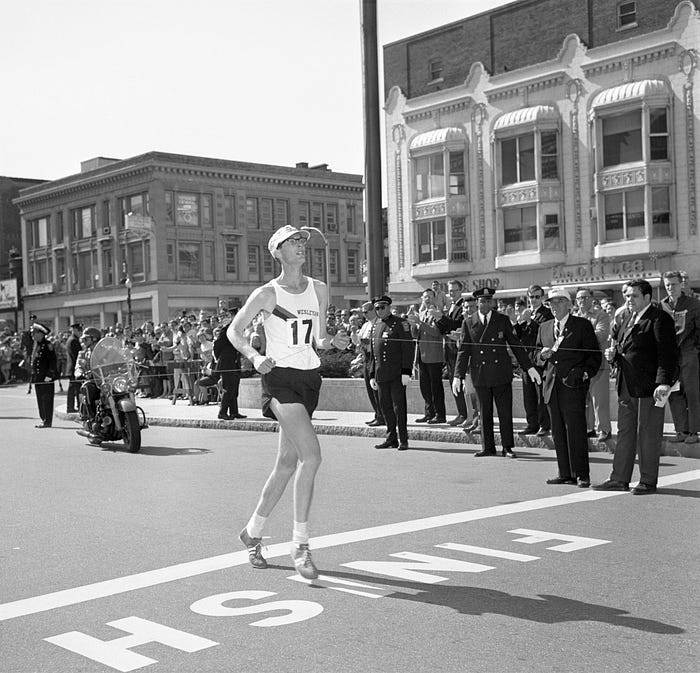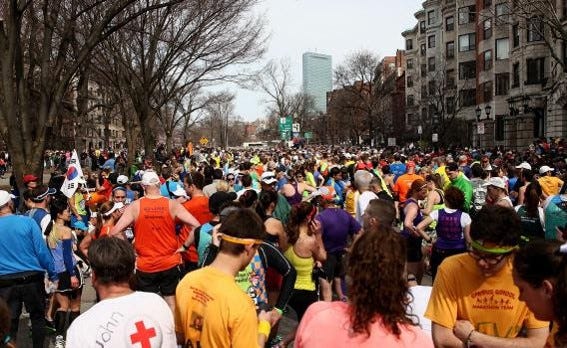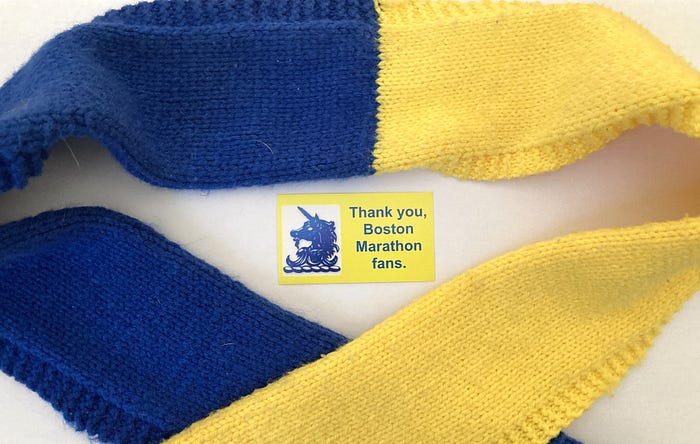

I Won the 1968 Boston Marathon. And Ran Many More. After the Bombs, Everything C...
source link: https://medium.com/runners-life/the-author-won-the-1968-boston-marathon-and-ran-many-more-after-the-bombs-everything-changed-d4ab2f44205
Go to the source link to view the article. You can view the picture content, updated content and better typesetting reading experience. If the link is broken, please click the button below to view the snapshot at that time.
Boston Marathon
I Won the 1968 Boston Marathon. And Ran Many More. After the Bombs, Everything Changed
There’s a time to run for the win. And a time to realize that other things are more important.

The author, Boston Marathon, 1968. (Note shadow, mentioned in story.) Photo courtesy Jeff Johnson.
More than a half-century ago I ran each Boston Marathon consumed by thoughts of winning. In April 1968, I actually achieved that impossible dream.
These days, 55 years later, I’m still running Boston. Mainly to give thanks. So many thanks. It doesn’t matter how slowly I cover the course, or where I finish. The miracle is that I can still run 26.2 miles on foot from rural Hopkinton to downtown Boston’s Copley Square.
Here’s one small example. Three weeks ago, I was ready to scratch from this year’s race. I pulled a groin muscle somehow, and had to abandon three successive runs after just two miles. I felt a thick gloom settling over me. But then one short visit to a physical therapist shocked my muscle back to functional health.
Thank you, amazing human body. Thank you, muscle fibers that are now re-aligned. Thank you, Steve, my PT. I’m not absolutely positive I can go the distance on Monday, April 17, but I’m feeling optimistic again.
In April 1968, I wanted to win Boston more than you can imagine. My coach and mentor, John J. Kelley, had been the last American winner — way back in 1957. I hoped to pay homage to him.
Also, I had trained insanely hard. They tell me the 1960s were a time of “sex, drugs, and rock ‘n roll” on American college campuses. Maybe that’s true. But I couldn’t confirm it to you.
I went to bed every night at 9:30 pm, and woke up the next morning at 6 am for the first of my two daily runs — a 9-miler. On spring break, while others frolicked on the Florida beaches for a week, I logged 175 miles in training. My more typical weeks were still well over 100 miles.
Marathon day was Saturday, April 19. That means I command a footnote in Boston Marathon history. I was the last runner to win a Boston that wasn’t on a Monday. The day dawned sunny and warm.
Famed sports columnist Red Smith once quipped that writing wasn’t difficult. You just had to “open a vein and bleed.”
That’s how I feel about my Boston run in 1968. Winning wasn’t that tough. I only had to run to the edge of implosion. Going up Heartbreak Hill at the 21-mile mark, I pushed harder than ever before. I knew I couldn’t sustain the effort for long.
But I didn’t let up. I needed to break away from the runner behind me. Because there was a problem. I knew him, and he knew me, and we both knew he had a faster finishing kick. If I couldn’t gap him on Heartbreak, I had no chance to win.
The Boston course runs West to East, especially over the Newton hills. With the mid-afternoon sun on our back, we runners see our shadows stretched out in front. The runner tailing me chose to sit back a half stride. That meant I couldn’t see him out of the corner of my eye. But his shadow! There it was … like a haunting Edgar Allen Poe creation.
I couldn’t go any faster, but I did anyway. My breathing turned violent — a swirling tornado. This was my last chance. I had to give it everything. But the shadow never budged!
I still remember the precise moment when I reached the top of Heartbreak Hill. The shadow! Still there. I felt total despair. My knees buckled briefly, and I wondered if there was any point in fighting on. I thought: “You’re racing a ghost, and he’s going to win in the end. You might as well quit now, and save yourself further suffering.”
Somehow I mounted the resolve to stumble onward. A few minutes later, almost blinded by the sweat in my eyes, I looked for the shadow. Gone! My ghostly pursuer had cramped on the downhills. (By the way, we’re good friends now.)
I’ve heard other marathon winners talk about how they enjoyed the last several miles. They got to “savor” their victory. Not me. I only tasted fear. I ran the last 5 miles like an antelope with a Big Cat in hot pursuit.
I would have made an easy catch, but no one managed to chase me down. At the finish, I collapsed like a wet noodle into the arms of Jock Semple, the legendary race organizer
Over the next 20 years, I ran Boston now and again. Then I began returning on the precise 5-year anniversaries of 1968.
Why has everyone stopped running?

Boston Marathon, 25-mile mark, 2013. Author photo.
That meant I was on the Hopkinton start line in 2013 to celebrate my 45-year anniversary. And I admit, I was feeling pretty good about myself. No other former Boston winners my age were still running. I counted that as a singular accomplishment even if I was finishing two hours behind the winner.
Which is right where I was at the 25-mile mark when I encountered something I had never seen in a road race. Just ahead of me, every runner had stopped in the middle of the road. Soon there were hundreds, then thousands of us milling about, perplexed and confused. We were near exhaustion, yes, but eager to continue. Only one mile to the finish line. We got this.
I hadn’t heard anything or seen anything to necessitate a stoppage. What the heck? I got antsy, even angry. Why was I being deprived of my glorious 45th anniversary finish?
Eventually a few folks in official-looking gear told us to disperse and walk back to our hotels. En route, I saw the flashing ambulances, heard the piercing sirens, and realized something awful must have happened. But I didn’t comprehend the horrible reality until I reached the hotel lobby. There, everyone was gathered in stunned, stony silence around several TVs.
When the full scope of the tragedy finally sunk in, I felt ashamed for my prior upset and grumblings. Others had died or were maimed. How could you weigh one more marathon medal against terrorism, mayhem, and lives that were disrupted forever?
That experience changed the way I run the Boston Marathon. The next year’s “comeback” race was the greatest marathon the world has ever seen. Some had predicted the opposite — that running on open, public roads would disappear. They couldn’t have been more wrong.
The 2014 Boston Marathon brought out spectators in larger numbers than any year before. They were eager to show their resilience, and to welcome us runners back to Boston. Every runner felt the same — that he or she was running to thank the locals who had endured such pain the previous year.
It was impossible to tell who was cheering louder for whom. The support and love flowed both ways with equal charge.
All weekend I wore a Peace scarf in the Boston Marathon’s bright blue-and-yellow colors. These were knitted and distributed for free, 7000 of them, by friends of the Old South Church at the finish line. I consider this scarf my greatest Boston memento — a simple, beautiful emblem of the Boston community’s appreciation for us runners.
You can have my winner’s medal. But not my Peace scarf. I have worn it at every subsequent Boston.
On race day, I ran for Team MR-8 to raise funds for the Martin Richard Foundation, which I have continued to do. Martin is the young boy killed by the first bomb explosion. Several months earlier, after the mass school shooting in Sandy Hook, Connecticut, he had painted a small poster that said: “Stop hurting other people. Peace.”
“Every mile is a gift.”

Boston Marathon “Peace” scarf from 2014; Author’s “Thank you” card to spectators. Author photo.
I also began a couple of other traditions that have become an integral part of my Boston Marathons. For one, I now run Boston with a pocket full of business cards that say: “Thank you Boston Marathon fans. Your cheers and constant support are what make Boston the world’s greatest marathon.”
As I run the twisty, rolling roads, I look for youngsters with outstretched palms, and hand them a card. I also select a few oldsters, sometimes in wheelchairs at roadside. These are the people who have been applauding Boston runners longer than I have been doing the marathon. Occasionally, someone takes a photo with my card and emails it to me later.
Most important, I have a new finishing routine. Boston runners often refer to the course’s last half mile as “Right on Hereford. Left on Boylston.” These are the last two streets we cover. The short trek on Hereford is slightly uphill — nasty!
But then comes the most glorious stretch of marathon road in the world. When you turn left on Boylson — which is slightly downhill and heavenly — you can see the huge Boston Marathon finish banner straight ahead. It’s more distant than you might want it to be at that point, a full 600 yards, but you can see it all the way. And it exerts a magnetic force that pulls you down Boylston no matter how battered your legs.
Since the road is smooth and fast, and Boston is “the people’s Olympics,” a lot of runners sprint the final yards to show their stuff. Not me. I walk.
In fact, I stop running at the spot where the second bomb exploded in 2013, about 70 yards before the finish. I slow to a walk, then turn around to face the oncoming runners. They are being applauded widely by thick crowds on both sides of the road, but I get to greet them in the middle of the action.
It feels special. After all, we are one and the same: Boston Marathon finishers. We have made it from Hopkinton to Copley Square over the world’s oldest, most famous marathon course (and one of the most difficult). Maybe we’re not going to receive a big prize check, but it feels very much like we are all Boston Marathon winners.
I try to lock eyes with one or two of these wildly smiling runners. “Way to go,” I yell. “Great job. You’re finishing the Boston Marathon.”
As I approach the spot of the first bomb explosion, just 10 yards from the finish line, I turn back around. Now I just stop in place for a moment. I’m not a religious man, but I’m not ignorant either. I know what I have been given. So I raise my eyes and two prayerful hands skyward, and utter a whispery, “Thank you.”
After all, I don’t know if I’ll ever be here again. Life gives us no guarantees. But I do know for sure that right now there is no other place in the world I would rather be. And it seems entirely appropriate to acknowledge that.
I’ve actually developed a mantra since 2013. This came as a surprise to me. Like I said, I’m not very spiritual, and I never previously felt the need for a mantra. Now I do. Mine goes like this: “Every run is a new adventure, and every mile is a gift. Every mile is a gift.”
I can’t stand in the middle of Boylston Street forever, so I lower my eyes to appreciate the splendor of the BAA Boston Marathon finish banner. Then I walk slowly and gratefully across the finish line. I feel no sense of hurry. It doesn’t get any better than this.
Recommend
About Joyk
Aggregate valuable and interesting links.
Joyk means Joy of geeK